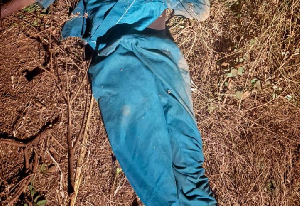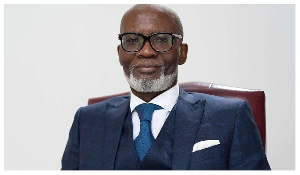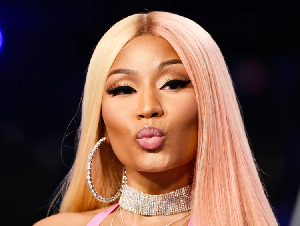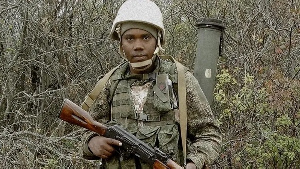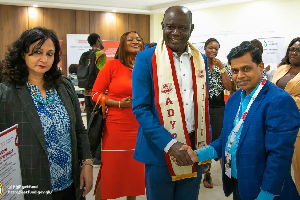The media is one of Ghana's ever growing sectors of employment and with sports getting bigger and bigger each day, many people are gradually joining the sports media workforce. The focus of this piece is on our work as sports journalists and whether those of us in the present generation are living up to the legacy that past legends of our profession have left us. Perhaps it would be good to take a retrospective look at hat pertained then and what is happening now.
Back in the day, there was only one radio station (GBC), the state-owned papers (Graphic and Times) and only one TV station. There was no such thing as the internet and before you got the chance to either write or present sports on either radio or television, you will have undergone years of being an apprentice before you even get the opportunity. The deputy minister for Youth and Sports, Hon. Nii Nortey Dua, who used to be my boss at Metro TV, once told me that he had to wait on the sidelines for years before the absence of a colleague opened the door for him to showcase his abilities. He is of course one of Ghana’s legends when it comes to football commentary on radio. In fact, legends like Kofi Badu, Joe Aggrey, Joe Lartey and Nii Anum Thompson made the profession very attractive. The next generation that took over them also had stars like Felix Abayateye, Rex Danquah, Kwabena Agyapong, Kwabena Yeboah, Christian Abbew, Ackah Anthony and Moses Foh Amoaning amongst others. In fact, virtually all of them went through the mill and are established legends. For the electronic media for example, talents had to attend the Ghana Broadcasting Corporation School of Radio and Television for years before getting the opportunity. For print, the training at the time at the Ghana Institute of Journalism (GIJ) ensured that journalists at the time were of the highest quality and clearly it showed.
The proliferation of private radio stations and private newspapers in the late eighties to early nineties afforded many more people who dreamt of becoming sports journalists the opportunity of doing so. Emphasis was not only on qualifications from GIJ, but on raw talent which could be properly harnessed with quality training. In fact, I belong to the group of people who didn’t go to GIJ but were very lucky to be given a chance (more on that later). The advent of Multimedia Broadcasting Corporation (MBC), operators of Joy FM and future sister stations ensured that new standards of broadcasting were set and emphasis still remained on quality and not quantity. Other stations like Choice FM picked up and it appeared that several emerging stars of the field were emerging. Choice FM produced star journalists like Yaw Ampofo Ankrah, Ibrahim Sannie Daara, Randy Abbey and Michael Ocansey amongst others who have since progressed throughout the years.
With time, the demands of the listening market, plus the levels of literacy in Ghana as a whole led to the proliferation of radio stations whose major medium of communication is the Akan language. Peace FM blazed the trail and gradually won a sizeable share of the audience market; MBC responded by taking over Groove FM, naming it Adom FM in a bid to take on Peace FM for a piece of the action in the Akan-dominated market. At the time, Luv FM in Kumasi, where I worked at the time was being given a significant run for its money by Fox FM, whose major medium of communication was Akan and because the literacy levels in Kumasi are not too high, there were times when we had to use Akan to communicate to our listeners in a bid to keep up with Fox FM.
Gradually more Akan stations sprung up, but with it a worrying trend. True, we have had top sports journalists spawned and the likes of Michael Oti Adjei, Sannie Daara and Yaw Ampofo Ankrah have gone on to work for the BBC, but eventually, all you had to do was to show that you were fluent in the Akan language plus a passion for sport, and you could easily get employed as a sports journalist at a radio station. Sometimes, checks into educational backgrounds of such journalists are not detailed and most worryingly, such journalists are not able to express themselves properly in English. The radio owners do not look at this; rather, because majority of the listening public would want to listen to and express themselves in Akan anyway, failure to express themselves in English is no longer a cause for concern. I am focusing on radio, because that is where most of the problems seem to come from.
Research, a distinct lack of bias and a good understanding of issues are supposed to be prerequisites that would make you a good journalist, especially a sports journalist, because our duty is to educate, entertain and inform, but such good tenets are thrown to the wind these days. With the approbation from a listening public, most of whom are semi-literate and illiterate, many sports journalists and presenters just turn up for programmes, present issues on the surface and sometimes even misinform the public without the proper research being done, even with a valuable tool as the internet available. We are not doing our job properly. Nicknames are being used by some of us instead of our real names and the risk is that we are not taken seriously by the listening public. On many occasions, when it is time to interview personalities who do not speak the Akan language, then it becomes a major problem because some of us cannot express ourselves well in English. Also some of us are not receptive to feedback at all. We resent people who offer constructive criticism about our work because we feel that we have arrived and we do not want to learn. We therefore end up stagnating, instead of improving because arrogance is now firmly built into our DNA.
Because the average levels of remuneration for sports journalists in the country is sometimes below expectations, some of us have taken to singing praises of leading sporting personalities in the countries, with the aim of making extra money from such personalities. As such, constructive criticisms are a rarity and you are seen as a pariah if you do so. There are times when most of us will not touch a story because it might be negative towards a club we support or a personality who heads such a club, or indeed the national team. We therefore end up doing the public a great disservice by not letting them in on certain issues. We attempt to please everybody by only doing pleasant stories because we believe that in so doing, we will always be able to get exclusive interviews with such personalities since we never criticize them. If you attempt to criticize anyone, you are seen as a maverick and sometimes your own colleague journalists will take you on. I am writing all this from personal experience and believe you me, it is not pleasant, but it is an occupational hazard you have to go through.
Some of us have taken to bad-mouthing our own colleagues to the powers that be simply to gain favours, in the form of cash, exclusive interviews or other benefits and the lack of unity amongst us is absolutely terrifying. In fact, there is no such thing as an independent opinion because some of us think that once we hold a view, that view should be subscribed to by everyone, and anyone who fails to do so is targeted and sometimes ridiculed, abused and insulted by colleagues for daring to express divergent views. We have indeed forgotten that we all cannot have the same view and so we should tolerate divergent opinions. One of the biggest ways of making money these days is setting agenda on behalf of certain personalities, getting the desired effect on the public and receiving the pay off at the end.
As a result, we are no longer respected by the powers that be because we can easily be manipulated and instead of performing our duties as the fourth estate, we have become pseudo spokespersons for such personalities. One of the most distressing times for me is during press conferences when some of us end up disgracing ourselves by revealing a lack of knowledge of the issues or an inability to express ourselves in English. Indeed, standards have gone down the drain and we have no one to blame but ourselves.
One of our biggest problems is that we also tend to focus too much on football at the expense of the other sports. In fact our ignorance of other sports is so palpable that we cannot do good programs on such sports and we end up driving our audience to focus on only football. I for one did not know much about hockey, but I was very fortunate to be given the opportunity to run commentary during the recently held African Hockey Cup for Nations, and for me it was a tremendous learning experience which drove home the point that I had perhaps focused too much on football. I ended that tournament a better journalist and I believe that we should do the same for other sports. My colleague at Metro TV, Prince Annang has carved a niche for himself as an expert on other sports and that is the standard we should all aspire to.
It is about time that operators of our radio stations, both English and Akan speaking, made it a prerequisite for aspiring sports journalists to have the following attributes; an ability to communicate effectively in English, a sound educational background and the humility to learn on the job. Also, such radio concerns should also invest into properly co-ordinated training programmes for staff of the said concern. MBC does a good job of that and other concerns need to follow suit. Some say that our employers do not pay us enough, but I say that let’s invest in ourselves to excel in our field and the money will come by itself.
I will end by describing how I got into sports journalism. That was in August 1998 when I applied to be a news reader at Luv FM, which had just begun operating in Kumasi at the time. I will be forever grateful to Peter Ofoe Diogo, who took a chance on me when I had no experience whatsoever, and Cox Tamakloe, who first offered me the opportunity to work in sports journalism. I underwent quality on-the-job training under these distinguished gentlemen and eleven years and many mistakes later, I am happy to say that I am still learning on the job (you can never stop learning) and I am always looking to improve myself, which is what, as journalists, we all have to do to sustain quality in our work. For now, we have a major responsibility to restore the dignity and prestige that our profession once had and in so doing, win the respect of the powers that be so that we are no longer viewed as tools that can be manipulated, but as a significant pressure group that can play its role as an effective watchdog. For now, the onus rests upon us.
Opinions of Friday, 27 November 2009
Columnist: Opoku, Christopher


